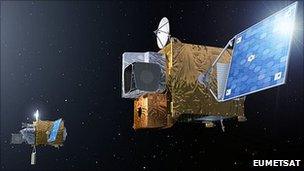Meteosat project in further hitch
- Published

The first MTGs will launch later this decade
Portugal's financial difficulties are threatening to hold up the development of Europe's next-generation weather satellite system.
Member-states of Eumetsat, the agency charged with operating the continent's Meteosats, want to begin preliminary activities in January.
But Portugal, which has vast public debts, says it is not ready to commit to the multi-billion-euro project.
Under its rules, the 26-nation Eumetsat organisation has no choice but to wait.
The Iberian country is said to be reassessing all of its international investments. Eumetsat officials told the BBC they were hopeful a positive outcome to the impasse could be found in the next few weeks.
"They haven't given us a precise indication of when they will be able to vote on the authorisation to proceed, but we are working very closely with them with the objective of having the approval in January," explained Angiolo Rolli, Eumetsat's director of administration.
Meteosat Third Generation (MTG) will be one of the biggest and the most complex space projects ever undertaken in Europe.
The system will comprise six satellites, with the first spacecraft likely to be ready for launch in 2017.
They are expected to bring a step change in capability, resulting in more accurate and more detailed weather forecasts through to about 2040.
The new system will cost Eumetsat member states 2.4bn euros, and the nations of its R&D partner, the European Space Agency, will be contributing a further one billion.
The industrial contract to construct the spacecraft has been the subject of protracted negotiations but has now been agreed, and the Portuguese problems will not affect that work.
However, Eumetsat, which has the key responsibility of operating the satellites once they are in orbit, has yet to formally approve the programme.
Twenty-two of the 26 member nations informed a Council meeting in Darmstadt, Germany, on Wednesday that they could do so, representing 86% of the required funding.
That left Spain, Switzerland, Belgium and Portugal unable to commit.
The Spanish and Swiss delegations need some more time to organise their contributions and are expected to come onboard before the end of the year. Belgium and Portugal have deeper problems, though. The former has not had a ruling administration since a general election in June and the latter continues to face questions over its financial stability and whether, like Greece and Ireland, it will need a euro bail-out.
As a consequence, Belgium and Portugal are not currently taking decisions on international investments such as MTG.
Nonetheless, 25 Eumetsat members - including Spain, Switzerland and Belgium - were prepared to support an "authorisation to proceed" that would have allowed Eumetsat to at least initiate work on MTG. But even this was not possible for Portugal.
Some pressure is now mounting on the MTG programme.
Although the current weather satellite system is in good shape and there are spare satellites in storage yet to launch, an extended hold-up in MTG runs the risk of gaps in service if existing spacecraft fail unexpectedly or the new programme encounters technical difficulties during development.
"We are making progress; we've had another step in the process but we're not yet there," Mr Rolli told BBC News. "All the major member states are onboard, and we got Romania onboard which joined Eumetsat only this week."
The director remained upbeat that all nations would eventually approve the programme.
"We've been here before - we've had similar situations in the past," he said.
Wednesday's council meeting appointed Alain Ratier, currently the deputy director-general of Meteo France, to succeed Lars Prahm as Eumetsat director general starting on 1 August next year.
Dr Prahm has been in the post since 2004. The new director general will serve an initial term of five years.
- Published19 November 2010